An Employment Contract is a legally binding agreement between an employer and employee that clearly outlines the duties, obligations, and terms of engagement during their working relationship.
An employment contract includes the names of employee and employer, salary, period of employment, benefits, responsibilities, hours of work, and any other terms as agreed. The status of employment of an individual being recruited depends on IRS tax classification; W-2(employee)or 1099 (independent contractor
An employment contract can also be referred to as:
- Job Contract
- Employee contract
- Contract of employment
- Employment Agreement
There are certain IRS requirements based on which, the companies that are hiring USA citizens and residents require you to have the following documents:
- IRS Form W-4
The IRS Form W-4 form is filled by the employee at the beginning of the employment, and it’s used to determine the number of deductions the Employer will withhold from your payments.
- IRS Form W-9
The IRS Form W-9 is generally filled by an independent contractor or freelancer at the beginning of employment if the services or labor to be paid for is more than $600. The W-9 provides a report to the IRS about tax information.
Free Templates
Standard employment contracts
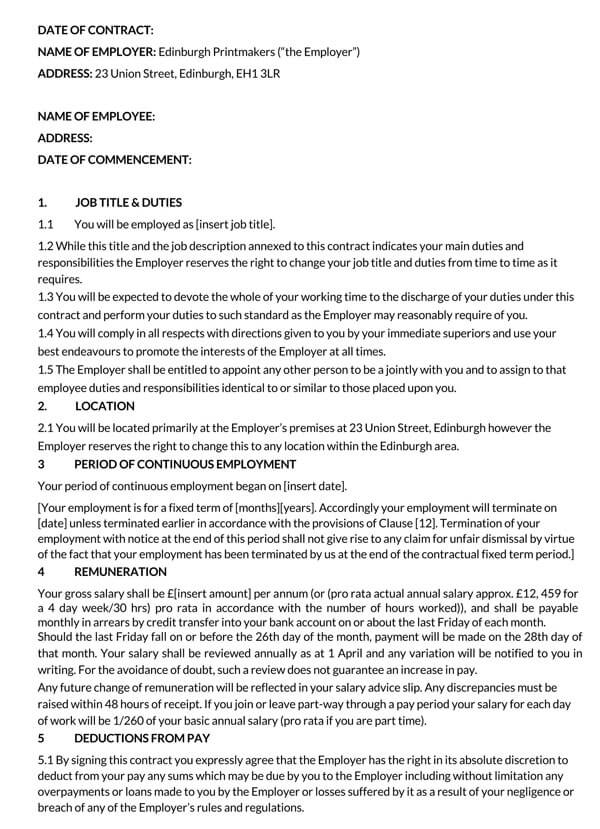
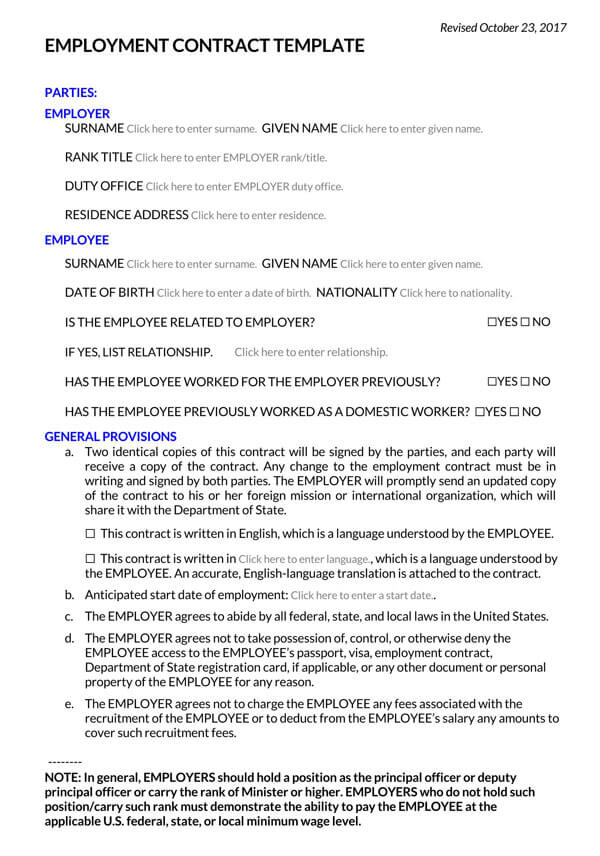
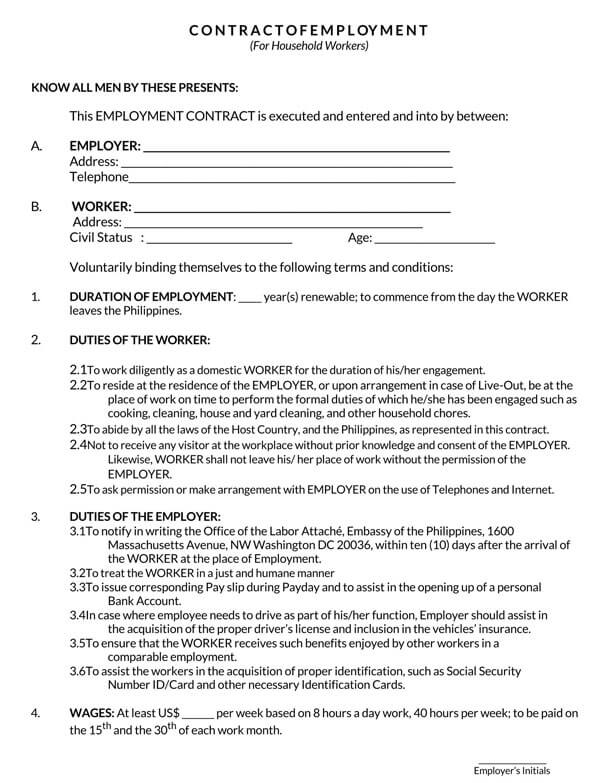
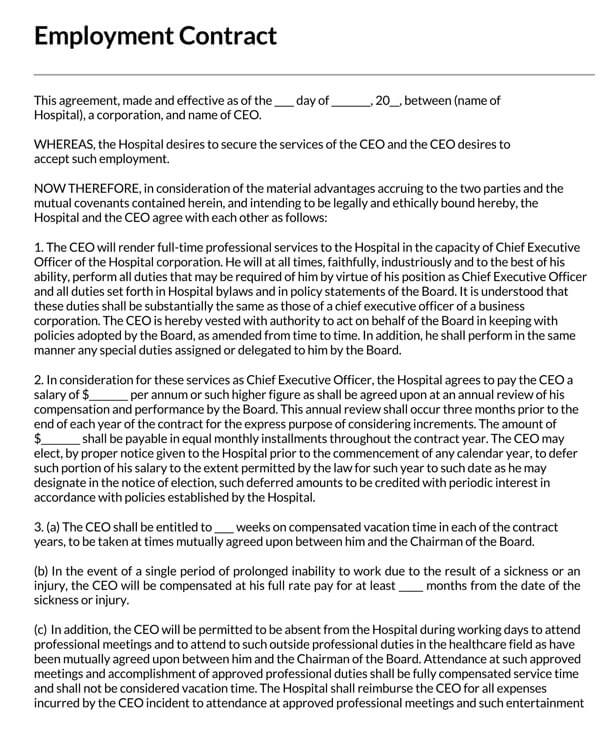
State-specific employment contracts
Pros and Cons of an Employment Contract
A job contract has its own advantages and disadvantages to the employer and employee.
These advantages can be categorized as pros or cons in the following ways:
Pros
- The roles and responsibilities of the employee are clearly outlined in the employee contract, and the employee understands what is expected on the job.
- The employment contract protects the Employer as the employee can not disclose any business secrets to the competitors.
- An employment contract provides stability to the company since the best employees are tied to a company under a stipulated time.
Cons
- An employment contract limits the Employer from letting off an employee who is not performing and has not breached any section of the agreement.
- Employment contracts are legally binding to both parties, and there are repercussions when either party breaches the contract.
- For any change to happen in the employment contract, both parties must renegotiate the terms of the agreement, resulting in more legal costs.
Non-Compete, Non-Solicitation, and Confidentiality Clauses
Non-compete, non-solicitation, and confidentiality clauses are usually inserted in the employment contract by the employer to safeguard him or herself from any incidences that might occur which may lead to losses.
These clauses are described below in detail:
Non-compete clause
A non-compete clause prevents an employee from working for another business competitor during and after terminating the employment contract. The non-compete clause usually is effective until a specific time after the employee has terminated the contract, and it’s usually stipulated in the job contract with it being limited to a specific geographic area.
Non-solicitation agreement
A non-solicit agreement in an employment contract forbids an employee from asking the other employees or clients to shift to another direct competitor company. It’s only valid for 1 to 3 years from the end date of the employment contract.
Confidentiality clauses
A confidentiality clause prohibits an employee from sharing any secrets or information that belongs to the company during the period of employment and even after the end of the employment contract without being permitted by the company. Confidentiality clauses are generally valid for a specific period, and it’s clearly outlined in the contract, after which it becomes null and void. The confidentiality clause may last indefinitely or until the company releases information to the public or have a validity date. For example, a year after contract termination.
Types of Employment Contract
There are several types of employment contracts, and as an employer, you need to understand which group an employee falls under before getting into an agreement.
The following are employment types and explanations:
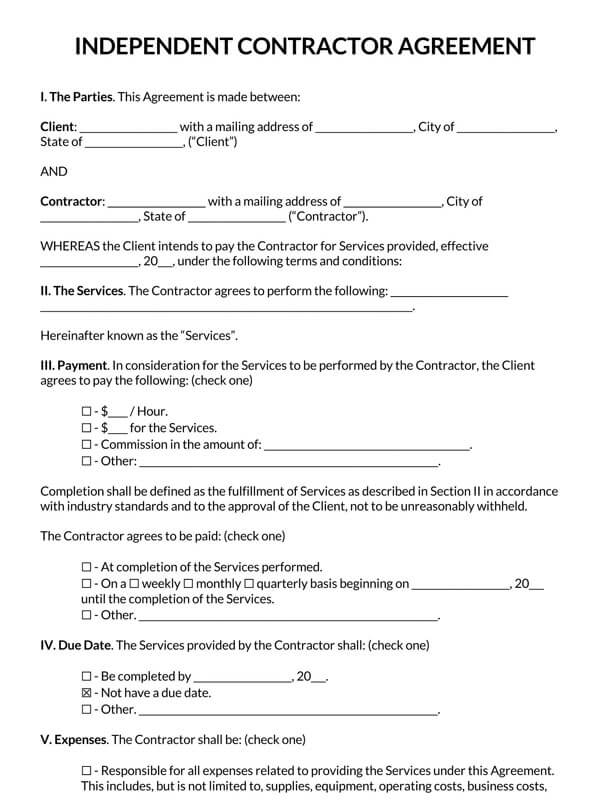
Independent Contractor Agreement
An independent contractor agreement is an agreement between a client and a service provider or a contractor. An independent contractor is not an employee and is paid for the service or the work done per the agreement. An independent contractor is categorized as a 1099 employee by the IRS tax classification.
Download: Microsoft Word (.docx)
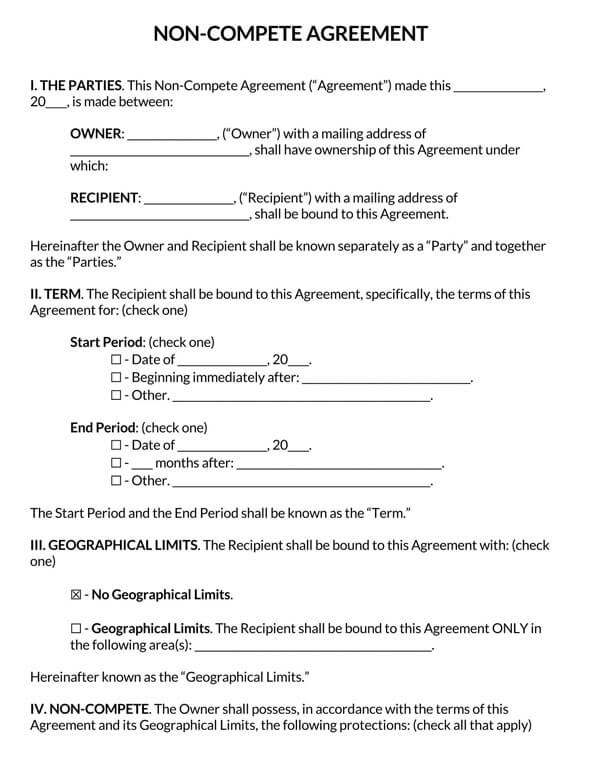
Non-Compete Agreement Template
A non-compete agreement prohibits an employee from working for a competitor or running a business like an Employer during their time of engagement or after for a specified period. This clause is valid for a specific time, and it forbids an employee from being a future competitor or working for a competitor.
Download: Microsoft Word (.docx)
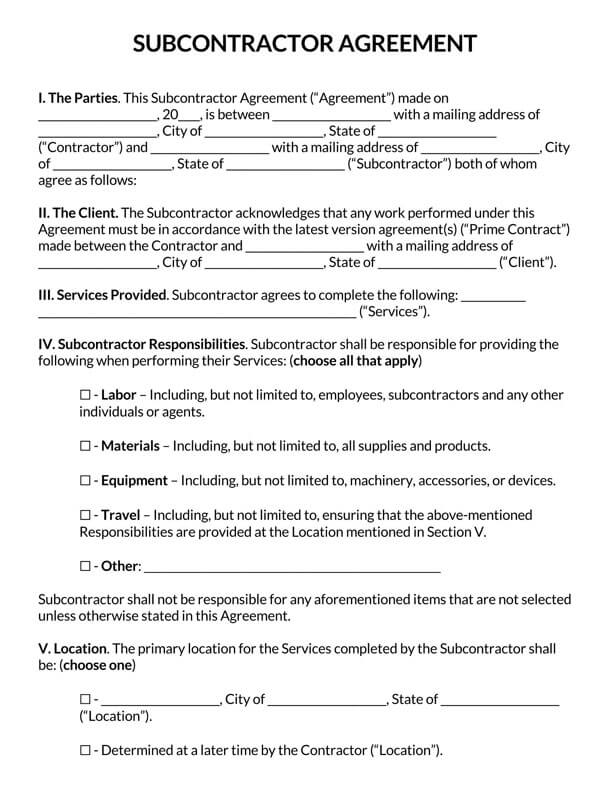
Subcontractor Agreement Template
A subcontractor agreement is an agreement between a contractor and a subcontractor that allows a contractor to give some part of the work to another subcontractor to complete a particular task. A subcontractor agreement is used to accomplish specific tasks of the original agreement by hiring other experts to do it.
Download: Microsoft Word (.docx)
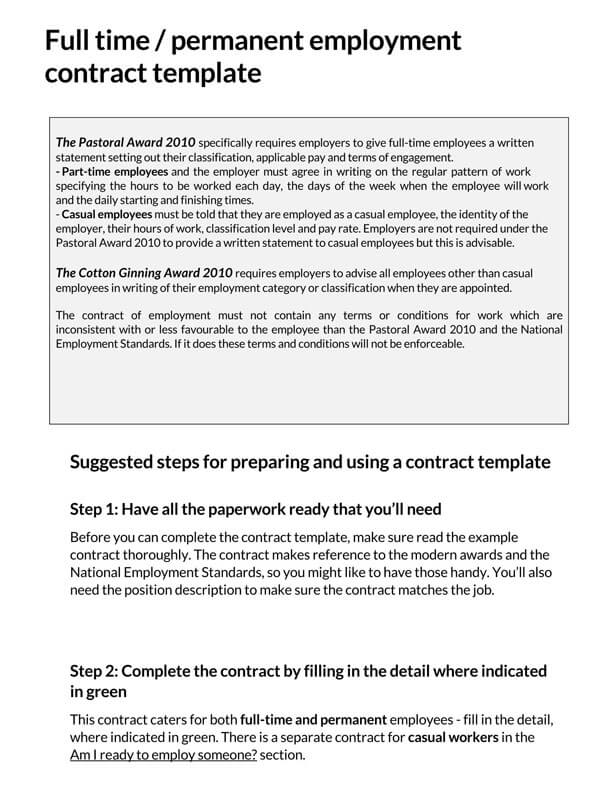
Permanent Full-Time Contract
A permanent employee is contracted to an employer to accomplish a specific type of work for a particular time or hours. A permanent employee contract has no specified end date in the employment contract agreement.
Download: Microsoft Word (.docx)
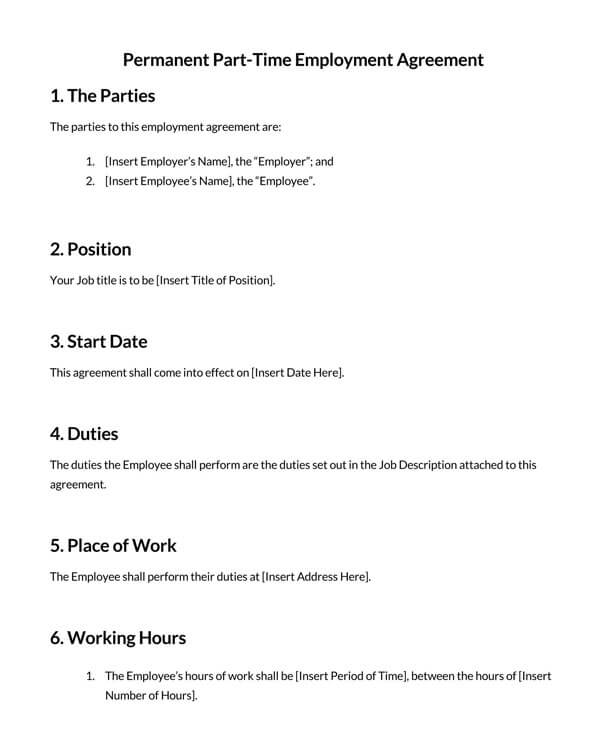
Permanent Part-Time
A permanent part-time employee is contracted to work for several hours and will not adhere to the full-time hours. A permanent part-time employee has no pre-determined date for the contract to end.
Download: Microsoft Word (.docx)
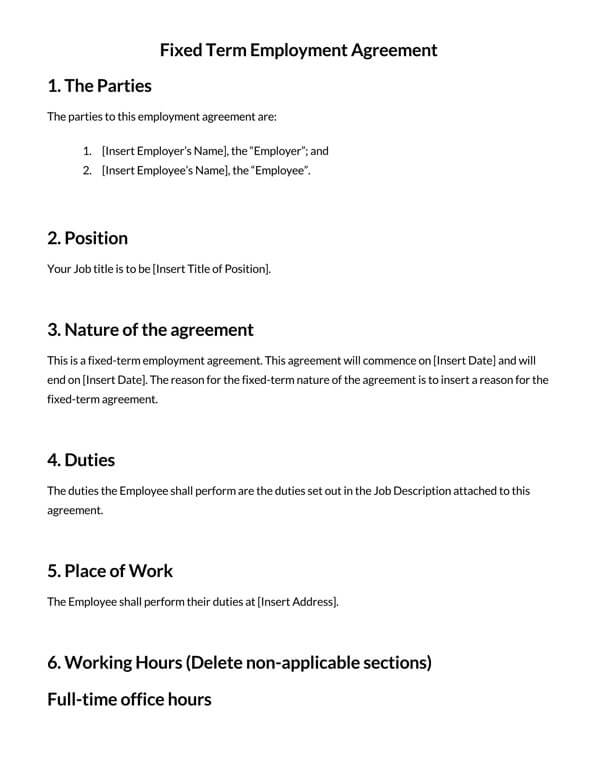
Fixed Term Employment Agreement
A fixed period or term employment contract is between an employer and employee that runs for a specified period. This type of contract automatically gets terminated when the date specified in the contract reaches, and the Employer has no obligations to notify the employee.
Download: Microsoft Word (.docx)
Who Needs an Employment Contract?
For any officials involved in any business organizations or entities, the employment contract possesses a particular significance.
An employment contract is typically an essential document to the following parties before starting an engagement:
- Hiring managers and employers hiring new employees.
- New employees who are looking to get employed and do not have any preexisting contract with another employer.
Additional Employment Information
There are certain factors or characteristics that are of great importance to be known and acknowledged by any relevant people involved in the employment processes as these factors are associated with employment generally and are applicable and relevant to different employed individuals.
Some of such established and fixed factors that impact certain types of employment on a general level are as follows:
Minimum wage
The minimum wage is the minimum amount of pay that an /employer should pay an employee for the work done, which cannot be reduced. An authorized board usually sets minimum wage in a state, a labor court, or a union to protect employees from being exploited by employers with low pay.
Trial (probationary) period
A probationary period is when employers give new employees who join a company to gauge their suitability before employing them permanently. A probational period varies typically from one employer to another and typically starts with three months. During the trial period, the employer may end the contract without notice and is not obliged to compensate you. After an employee completes the trial period, the employer may decide to hire the employee on a permanent contract or terminate the employee. After an employee passes the probationary period, the employee will now be eligible for higher benefits, and a permanent contract may be negotiated.
Part-time vs. full-time working hours
A part-time employee has stipulated working hours; for example, they will be considered part-time if they work 35hrs or less per week.
Full-time work employees must work for a minimum of 35 to 40 hours a week before overtime is included. There are no laws that define work as full-time, but 35 to 40 hours per week is regarded as full-time work before overtime is included, and overtime is paid at least one and half times the normal pay.
Employee vs. independent contractor
An employee works for a company, and the employer is responsible for taking the withholding tax from the employee and is paid a salary. An independent contractor is not an employee of a company and works for their own business and is paid for every project completed. An independent contractor fills the W-9 and is responsible for paying their taxes to the state. An employee is required to fill the IRS Form W-4. An independent contractor does not get unemployment insurance and is paid
Preparing an Employment Contract
An employment contract is a legal document. Before writing it, you have to capture all the information, such as the names of the company and employee and the terms of employment, and clearly outline the employee’s responsibilities.
The following steps outline an effective way of writing an employment contract:
Declaration of employment
The following are important details that have to be captured in the declaration of employment:
- Employment start date: In the introduction of the contract, you need to state the date from which the contract becomes effective.
- Employer name: In the employment contract, the Employer’s name has to be stated for it to be effective. Any suffix of the company that refers to the official name of the Employing entity has to be included. For an employer who is a private entity, the official name of the Employer has to be recorded.
- Employer and employee address: In the employment contract, the address of both the employer and employee has to be included in the contract and the contacts of both parties.
- Employee name: The name of the individual being hired has to be clearly indicated and attached to the roles in the employment contract.
- Terms of employment: Before starting employment, the Employer needs to outline the obligations and roles to the employee in terms of employment in the employment contract. The terms of employment clearly state where you will be working, the compensation, roles of the and the period of engagement.
- Schedule: In the employment contract, you need to indicate the employee’s time to complete the assigned task by stating whether it’s full-time or part-time.
- Duration of employment: The employment contract states the Period or the length of time that a contract is valid from the start date. So in an employment contract, the employee may be under a contractual contract or a temporary.
Statement of responsibilities
For clarity in the employment contract, a statement of the responsibilities should be stated in the contract.
- General responsibilities: The responsibilities for the employee and the job description during the period of engagement for this position should be clearly defined in the employment contract.
- Confidentiality: The confidentiality clause is included in the contract to prohibit the Employer from sharing sensitive information from the company to outside competitors. The confidentiality clause validity is stipulated, and the period after which the agreement is terminated
- Communications: A formal contact such as an email address where queries and any relevant information about the agreement can be directed in the employment contract. In cases where an employee is required to handle communication channels such as websites, email, or social media, a contract will state that it retains ownership and communication control.
Employment period
For an employment contract with a defined period, the date at which the contract comes effective and the final date should be well documented in the contract.
Compensation
In a job contract, payment terms should be stated whether it is in hours worked or days. In addition, the deductions such as the tax percentage should be highlighted. In addition, the payment deductions from the payment such as State and Federal Taxes, Social Security, and Medicare are highlighted.
Salary/wages
The employee pay for the position in the job contract needs to be stated in numbers or figures and documented clearly in the employment contract.
- Benefits: In an organization, there are certain benefits that the Employer offers to the employee during the period of engagement, such as an insurance scheme or a pension.
Out-of-pocket expenses
Sometimes an employee may incur personal expenses such as traveling or lodging while undertaking employment responsibilities. The contract should provide clear information if the company will refund the employee or not.
Ownership interest
During a working relationship between an employer and employee, the employee may have the right to own part of the business. Therefore, a contract where an employee has ownership interest should be defined in the contract.
Trial period
The trial period is indicated in an employment contract to show the durations that an employee is expected to work temporarily. For an employee under the trial period, the time should be indicated and the privilege that is eligible to.
Vacation time
While in employment, an employer may give a full-time employee a certain number of days in a year for vacation while still receiving full salary and benefits. The period allowed for the vacation should be noted in the contract.
Personal leave
Personal leave is the time that an employee is exempted from work to attend to personal reasons. First, the Employer must state whether the employee will be eligible for pay for the leave period.
Federal holidays
Every calendar year, an employer observes a certain number of state holidays, and the employees are exempted from work during those days. The federal holidays in each year should be well stipulated in the employment contract
Non-compete/future competition
This clause should be included in a contract to protect the Employer, and its validity date is stated after the end of the contract.
Employer’s role
During the employment period, an employer may allow an employee to act on behalf of the business in a specific capacity or require an employee to seek authorization. In the contract, the Employer should have defined terms at which the employee may act or not.
Appearance
The Employer may specify where an employee may be required to work and report for specified days. An employer may give an option where an employee may fail to report to work physically due to unavoidable circumstances and still face no consequences
Disability
During the employment, an employee experience incidence that will render him disabled and no longer able to efficiently fulfill the assigned duties. As a result, the employer will have to set a notice period to notify the employer.
Notices
In an employment contract, any formal communication about the agreement, the employee should have a formal communication through the mail given in the contract.
Governing law
Where this employment contract is applicable, there are specific laws that both parties will have to abide by. The laws of the state where they are stated will help in controlling the contract, and in case of a breach, you will be charged in court
Signatures by employer and employee
After all the fields have been completed in the employment contract and both parties agree, they will be required to append their signatures and name. The hiring manager is usually mandated to sign on behalf of the organization.
Frequently Asked Questions
An employment contract is a contract issued to an employee to perform specific responsibilities for a certain period. A temporary employment contract is a contract between an employee and employer to work for a specified number of days or hours.
This is an oral contract between two parties who do not have a written contract but are obliged by the law to fulfill it. If you agree to perform a particular task for a person, you automatically get into an implied contract.












